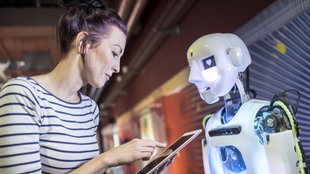
AI as an Instrument of Advancement
All links added to original content for enhanced exploration
Over the course of a single year, artificial intelligence has transitioned from being a speculative concept rooted in science fiction to becoming a practical tool leveraged for tasks such as enhancing resumes and planning travel itineraries.
The Rapid Evolution of AI
With the swift evolution of AI models such as OpenAI's ChatGPT and Google's Gemini, questions naturally arise as to whether these systems could one day entirely replace human capabilities.
However, many experts in the field of technology believe such an outcome remains far from imminent.
"AI can certainly recognize your house cat, but it's not going to solve world hunger."
- Theo Omtzigt, Chief Technology Officer at Lemurian Labs
The Mathematical Limitation
Mathematics serves as a fundamental limitation to AI's potential to fully replace human beings.
Pattern Recognition vs. Understanding
The reliance of AI systems on mathematical frameworks highlights the complexity of this issue. Large language models, a subset of generative AI, utilize robust mathematical algorithms to process vast datasets and identify patterns, enabling the generation of outputs such as text, images, videos, or audio based on user prompts.
Nevertheless, human intelligence surpasses basic pattern recognition, a key reason why the algorithms underpinning current AI systems are described by Omtzigt as "relatively super simple."
"Right now, the machine learns to recognize a cat and how it appears under various lighting conditions. To develop an AI capable of ethical reasoning, creative thought, and consciousness, substantial advancements in our understanding would be required before such systems could pose any significant existential risk to humanity."
Correlation vs. Causation
Fundamental Difference in Learning
Another critical distinction lies in the manner in which AI systems acquire and process knowledge, which differs fundamentally from human cognition.
"Generative AI and machine learning techniques are heavily predicated on correlation rather than causation."
- Justin Lewis, Vice President of Incubation and Engineering at BP
For instance, an AI model analyzing images of rain might associate rain with clouds due to their consistent co-occurrence in data. In contrast, humans inherently understand the causal relationship that clouds produce rain, as explained by James Brusseau, a philosophy professor at Pace University and AI ethics lecturer at the University of Trento.
"AI and humans are both creators of knowledge, just as sculptors and painters are both artists. However, they will perpetually differ in their methodologies and outputs. One is not inherently superior to the other; rather, they are fundamentally distinct."
The Real Challenge
AI will not replace humans; however, individuals proficient in its use will lead progress.
The Future of AI and Human Collaboration
For additional insights, consider reviewing the thought-provoking remarks by Bill Gates on the subject, accessible via this CNBC article.
The Real Divide
Concerns regarding AI replacing humans are not entirely unfounded. However, it is not the AI systems themselves that pose a threat, but rather the disparities that may emerge between those who embrace AI and those who do not.
"There's going to be a clear difference between individuals and organizations leveraging AI and those that abstain. Adaptation will be critical to remain competitive in the evolving landscape."
- Trevor Back, Chief Product Officer at Speechmatics
Currently, AI is widely viewed as a tool to enhance human productivity. For example, software engineers harness AI to expedite the code review process and detect potential errors that might otherwise have been overlooked.
The Importance of Curiosity
As AI is likely to remain an integral component of future innovation, James Brusseau stresses the importance of developing an understanding of these systems to mitigate concerns of obsolescence.
Final Advice
"Curiosity is essential. Rather than fearing what the machine might do to you, focus on exploring what it can do for you."
